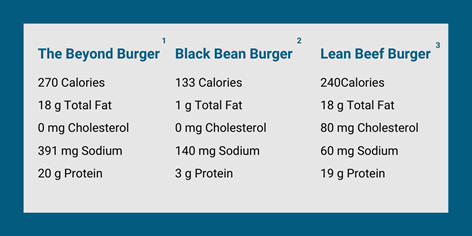What Does “Plant-Based” Mean?
A plant-based diet is one that consists primarily of foods that come directly from plants. Think vegetables, fruits, legumes, nuts, and whole grains.
A common misconception is that a plant-based diet means no meat or animal food products at all. In actuality, a plant-based diet contains mostly plant-based foods, yet doesn’t exclude food groups like meat or eggs. In other words, a plant-based diet is not synonymous with a vegan diet.
Why is a Plant-Based Diet Good for You?
Reducing your intake of meat, whether for ethical, environmental, or health reasons, can be beneficial for your health. However, be advised that there is a right way and a wrong way to go plant-based.
There is plenty of research that demonstrates incorporating more plant-based food into the diet can reduce the risk of cancer, heart disease, and diabetes. Short-term benefits include more energy, better digestion, healthier skin, and improved mood.
Plant-Based Meat vs. Animal Meat
Unfortunately, a food that is plant-based doesn’t necessarily mean it has been made with wholesome or healthful plant derivatives. In fact, most meat-free patties are made with highly processed ingredients, protein isolates, and refined oils.
If you are thinking of trading your beef burger for a meatless alternative, consider the nutritional profiles first, and then weigh your options.
For example, a plant-based meat patty, like the Beyond Burger, may have 0 cholesterol but also has high sodium and saturated fat levels. Depending on your motivations for making the switch, this may or may not align with your goals. Alternatively, a homemade black bean patty offers a meatless alternative that is low in cholesterol, sodium, and fat, while being packed with fibre, protein, vitamins and minerals.
Plant-based burgers can contain up to 600 mg of sodium and 10 g of saturated fat in just one patty. Compared to a typical beef burger, which contains roughly 100-300 mg of sodium and 5-10 g of saturated fat. For context, in Canada, the recommended daily intake for sodium is 1500mg for adults aged 14 to 50 years old.
Here is a complete nutritional breakdown of the Beyond Burger (a popular meat alternative), a black bean burger, and a beef burger:

Keep in mind, a homemade beef patty like the one analyzed above is much more nutritious than the one from your local fast food joint. Needless to say, any food product (animal or plant derived) is likely to be more nutritionally dense when prepared at home with whole food ingredients.
Eating nutritionally dense food should be the primary goal of anyone looking to improve their health. Our cells require a wide variety of nutrients to properly function and ensure that our bodily systems are running smoothly.
Following a plant-based diet means that you are incorporating more whole, plant, nutrient-dense foods into your diet. While meat-alternative patties don’t necessarily fit that category, there are endless opportunities when it comes to making healthy plant-based alternatives using whole, nourishing plant foods.
1. https://www.myfitnesspal.com/food/calories/beyond-burger-canada-1023551845
2.https://www.myfitnesspal.com/food/calories/vegan-black-bean-veggie-burger-93426859
3.https://www.myfitnesspal.com/food/calories/homemade-51312232
 Skip to main content
Skip to main content